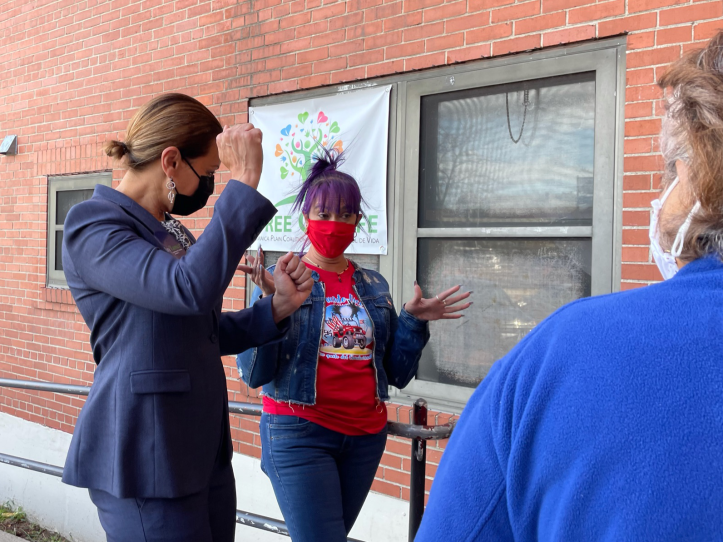At Bell Olmsted Park, Kendra Hicks’ apartment was a whirlwind as she prepared her 5-year-old son, Zaire, for school. The first-time candidate for District 6’s City Council seat, which represents most of Jamaica Plain and West Roxbury, jumped into the race to challenge outgoing Councilor Matt O’Malley last fall.
Hicks, a recently single mother, likes to bring Zaire to school on campaign days when she can’t put him on a bus. Zaire, who is nonverbal and has autism, looked around as his mom strapped on his Velcro shoes, put his jean jacket on, and grabbed his lunch while remembering a water bottle for herself.
When O’Malley decided to step down, he left a wide-open field that Hicks and Mary Tamer, a Menino-era Boston School Committee member, walked into.
More Politics
Tamer has seen the benefits and the pitfalls of going through the public school system through her own family. Her older sister struggled in school, especially when she started at the English High School in Jamaica Plain.
“My dad was very sick at the time,” Tamer said. “He was in his 40s and my sister missed almost an entire month of school in one term, and no one called my parents to let them know." Tamer’s sister then attended an alternative school, dropped out, and got her GED shortly before she died at the age of 23.
“One of the reasons that I fight so hard for kids in our school system is because there are people like me who made it through — and we were well-served, and I had amazing teachers,” Tamer said while driving. “But there are still too many people like my sister who are not being well-served and who don't have the right folks looking out for them supporting them.”
A City Council race that could have been a simple microcosm of Boston Democrats, split between the hard left (Hicks) and center left (Tamer) — though both eschew the political label — has devolved into a political bloodbath. Racial animus, social media spats and even a divide within a local family have made a national spectacle of the race that will be decided by just tens of thousands of voters, overshadowing real policy differences in a district that’s changing rapidly.

The Incidents, The Fallout
Hicks, 32, an Afro-Latina, is a woman of the left, endorsed by Boston’s Democratic Socialists. She is the director of Radical Philanthropy at Resist, a Jamaica Plain nonprofit funding smaller grassroots organizations around the nation. Tamer, 55, of Syrian and Lebanese descent, is a centrist by today’s standards, endorsed by outgoing councilor O’Malley. In addition to her term on the school committee, Tamer is currently research director for SchoolFact Boston, an education-focused nonprofit. Their bitter battle for the District 6 Boston City Council seat has become the crossroads of city politics in a time of flux, when voting patterns are shifting and the ascent of progressivism is a defining fact.
The race caught national attention when Tamer circulated a mailer with racial overtones, showing herself on the left, in color, and Hicks on the right, in black and white. In the middle is this text: “There are stark differences between candidates for District 6 City Council.”
Backlash to the mailer was swift and fierce. Political groups and some who said they were Tamer supporters denounced it. “In 2021, there is no place for such blatantly racist messaging in a campaign hoping to represent as diverse a community as District 6,” Hicks said in a statement.
Tamer’s campaign issued a response, doubling down on the mailer citing “clear policy differences,” but said it abhors “all racism.” (The candidates disagree on whether the Tamer campaign response was an apology: Tamer said it was, Hicks did not.) Third-place finisher Winnie Eke, who is Black and has endorsed Tamer, told The Boston Globe she thought this was a "false narrative of racism.”
Tamer also questioned Hicks’ Democratic credentials, pointing out that, according to city of Boston election records, Hicks did not vote in 14 of the last 20 elections, including the 2016 contest between Donald Trump and Hillary Clinton. To drive the point home, the Tamer campaign mass mailed to voters in District 6 copies of Facebook posts from Hicks’ account, including:
“Because I didn’t vote for Obama.” (November 5, 2020)
“I have absolutely no feelings about the possibility of having our first woman president be Hilary Clinton, none.” (November 8, 2016)
“hell f***ing no. third party always since I was old enough to vote.” (March 5, 2020)
“125+ Reasons You Should Not Vote for Joe Biden...” (March 6, 2020)
“the comparison of gay rights and civil rights also gives me the jibijeebes.” (June 26, 2015)
The hostility most recently boiled over on Twitter. Tamer’s campaign posted a graphicMonday containing messages from Hicks’ social media accounts, where the progressive candidate calls for police and prisons to be abolished as early as 2014. In a 19-post Twitter thread responding to Tamer, Hicks’ campaign manager Tonya Tedesco said that Tamer uses “right wing talking points and tactics in an attempt to suppress voter turnout” and that “old Facebook posts are not policy.”
It’s a political race that has even created divisions within families, exemplified by a sign debacle at Miami Restaurant in Jamaica Plain.
Tamer said, with the support of the owner, she put up her campaign’s signs in the front window months ago. When she returned to the restaurant to plan an event, they were gone.
“We arrived and Kendra’s team had ripped down our signs and thrown them away and put up enormous, like, $100 signs,” she said.
She pointed to a large 5-foot by 7-foot Hicks sign that Brian Dume, the owner’s son, dragged out for GBH News to see. Tamer said her campaign and Dume had removed Hicks’ signs, but Dume said he didn’t know who had done it, or where the signs had gone.
The answer seems to lie with restaurant owner Rafael Dume. Hicks told GBH News she met the owner after he initially had Tamer signs, and that he “invited us to replace the signs” and was excited to support her.

The Policy Beneath The Politics
Underlying the political mess are substantial differences between Hicks and Tamer when it comes to the contentious issues of policing, education and housing.
Hicks cites policing as an important reason for why she challenged O’Malley in the first place, before he announced he was stepping down. She said O’Malley didn’t have the “difficult conversations” needed following the murder of George Floyd. A big part of that was O’Malley’s vote in 2020 for the city budget, which included $414 million for the Boston Police Department when many councilors, including acting Mayor Kim Janey, were pushing for a decrease.
Tamer has painted Hicks as anti-police and says her own ideas are more inclusive of people in law enforcement. Tamer said she isn’t in favor of decreasing the BPD’s budget, but she is not proposing to increase it.
“This is a tough one for me,” she said. “When I think of an integrated approach, I think, what is that gonna cost us? Do I hope that we can work within the current budget? Yes.”
On the matter of education, Hicks supports an elected school committee because she believes people who are more invested in schools would have a voice. Tamer is in favor of a hybrid school committee, with both elected and appointed members.
Hicks supports rent control and wants to use at least half of city-collected linkage fees to help house low-income residents below 30% of the area median income, and expand city-funded rent subsidies. Tamer told GBH News she’d be open to increasing the amount of affordable housing required of new developers, but not above 20%.
The candidates' fundamental policy differences come down to a divide that emerges time and time again: Hicks wants community members to have more direct ability to make decisions, while Tamer wants to strengthen systems that already exist.
Who’s Voting?
Endorsements may be up in the air at the Dumes’ Miami Restaurant, but elsewhere, they’re falling into place. Hicks garnered big-name endorsements from Sen. Ed Markey, Rep. Ayanna Pressley, major unions including 32BJ-SEIU and the Boston Teachers Union, and State Sen. Sonia Chang-Díaz. Tamer noted that several of Hicks’ endorsements are outside of the district, and she relies on “real people endorsements,” although she is grateful to be backed by former Rep. Jeffrey Sanchez, Rep. Ed Coppinger, and the Floor Coverers Local Union, along with outgoing Councilor O’Malley.
City Council District 6 winds from the border of Dedham to Fisher Avenue off Mission Hill, Brookline to the west, Roxbury to the north and east. It’s home to white, conservative voters in West Roxbury, and progressives of Jamaica Plain (also a majority-white neighborhood, but becoming more diverse). Roslindale is also a small piece of the district.
The playing field is far different than what it was in 2011 when outgoing Councilor O’Malley had his maiden run for the seat. The vote used to skew toward West Roxbury voters — and white voters. But progressives are casting their ballots at record numbers in Jamaica Plain, evening the turf for which part of the district votes most.
Hicks won the preliminary vote in September by just over 50% to Tamer’s 43.4%. It was a difference of about 1,250 votes; not insignificant, but also not implausible for Tamer to close the gap. Tamer’s campaign has nearly $60,000 on hand to Hicks’ $45,000, per the campaigns.
But races are ultimately decided by the constituents.
Tamer said two of her most memorable endorsements came from the Mildred C. Hailey Apartments, where she does Zumba with residents every Wednesday morning. In a campaign stop with GBH News, Yolanda Torres, president of the Tenant Association, said she thought Tamer could help support the public housing complex, which she said was seeing a decline in police patrols. “I see her up and around here, and I don’t see others,” she said, telling GBH it’s important to her that city councilors be accessible to constituents in person.
Hicks also has supporters from the apartment complex, which has faced a slew of issues including mold, leaks and potential privatization, listed on her website.
Tamer said her other memorable vote of support came from a 95-year-old resident named “Ms. Jackson” who she exercises with.
Tamer recounted that they sat on a bench the morning after the preliminary election, and Jackson said, “I voted for you yesterday, Mary.”
“And honestly, that meant the world to me,” said Tamer.









